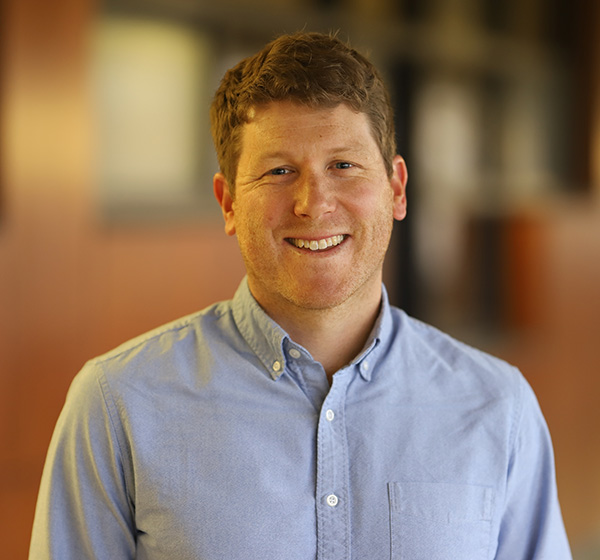
Michael Blatchley’s broad experiences in biomedical engineering and interests in tissue formation made him the perfect fit for both the College of Engineering and Computer Science and the BioInspired Institute. Get to know Blatchley as he discusses his career path, advice to students, and his new role as an assistant professor.
Tell us about yourself and what brought you to Syracuse University. What sparked your interest in teaching here?
I’m originally from Indiana, went to Purdue in my hometown of West Lafayette, lived in Baltimore, Maryland for graduate school at Johns Hopkins, moved to Boulder, Colorado during my postdoc, and now, of course, I’m in Syracuse. I’ve been lucky to experience many different areas of the country and loved my experiences in each place, but Central New York fits my interest in the outdoors, and Syracuse itself has been a great fit for my family.
I was drawn to Syracuse University by my great interactions with faculty and students, the investment in junior faculty, and the collaborative nature of a lot of the current research on campus. I can envision numerous collaborations within biomedical and chemical engineering (BMCE) as well as across disciplines in other departments. I’m really looking forward to working as part of the BioInspired Institute because I of course love the science and engineering components, but I also love the arts and think the crossover between the arts and sciences can lead to interesting and innovative ideas.
What are your research interests?
Despite my earliest career aspirations to become an NBA All-Star, my genetics precluded me from success along that career trajectory, so I decided instead to pursue a career in academia.
I’m interested in understanding how tissues form, and how we can take what we learn from biology to build ever-improving models of human tissues in the lab. We can use these models to understand aspects of fundamental biology and tissue regeneration, but also to model disease and, perhaps someday, produce lab-grown tissues for transplantation.
What made you interested in this research?
I became interested in this type of work through a circuitous path spanning a few different fields. When I was an undergraduate, I chose to major in Biomedical Engineering because I had broad interests in all fields that made up the “fundamentals of engineering,” and I liked how those could be applied to solving problems in human health. I also knew I was interested in research, so I looked for a number of different summer research opportunities throughout my undergraduate years.
I first worked at a small startup/contract research company synthesizing and characterizing different biomaterials for medical applications. I then worked in plant biochemistry for a summer through a program funded by HHMI to merge statistics and biology, where I learned a lot of transferrable research skills and how genetically modified organisms can be used to study fundamental science toward real-world applications. Finally, I worked in a clinical research lab with a focus on pulmonology. These broad experiences, combined with my exposure to tissue engineering during a course in my senior year, laid a perfect foundation for me to pursue a PhD with a focus on tissue engineering.
I went into the PhD program with more of an interest in translational work but really developed a love for work in building fundamental in vitro models as well. Since then, my work has spanned the spectrum of tissue engineering, from projects focused on more fundamental modeling of regeneration to designing materials to better characterize in vitro organ models, to engineering dynamic materials to control how tissues form in a reproducible and predictable way. I am fascinated by learning how tissues grow so we can better grow them ourselves, and the field of tissue engineering is perfect to pursue research questions around this central premise.
What are you most excited about in your role as an assistant professor?
Something that really attracts me about academia is the intellectual freedom. Along those lines, I am looking forward to continuing my own work and following my research interests in new directions through collaboration and discovery. But what I’m looking forward to even more is helping guide and mentor students and other trainees toward finding what they are passionate about in research or in their chosen career paths.
What advice do you have for students?
Don’t be afraid to go out of your comfort zone and learn new things. My most memorable classes helped me broaden my interests rather than narrow my scope of study. The same goes for research. I worked in a wide range of fields that helped me refine my interests to pursue research I was passionate about.
Always ask a question if you have it (maybe ask it in your head one time before you ask it out loud to make sure it’s thoughtful and constructive, but don’t be afraid to ask it!).
What are some things you like to do for fun?
I love to spend time with my family outside, hiking, biking, running, skiing, etc. I’m also a film buff, but weirdly my 18-month-old daughter isn’t as interested in Lynchian horror and 80s schlock as I am. I like to cook and bake, as well. Reviews range from feigned interest to shocking surprise.
